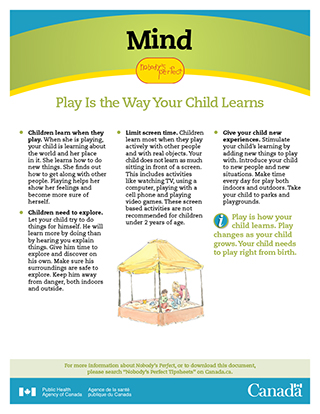Mind: Play Is the Way Your Child Learns
- Children learn when they play. When she is playing, your child is learning about the world and her place in it. She learns how to do new things. She finds out how to get along with other people. Playing helps her show her feelings and become more sure of herself.
- Children need to explore. Let your child try to do things for himself. He will learn more by doing than by hearing you explain things. Give him time to explore and discover on his own. Make sure his surroundings are safe to explore. Keep him away from danger, both indoors and outside.
- Limit screen time. Children learn most when they play actively with other people and with real objects. Your child does not learn as much sitting in front of a screen. This includes activities like watching TV, using a computer, playing with a cell phone and playing video games. These screen based activities are not recommended for children under 2 years of age.
- Give your child new experiences. Stimulate your child's learning by adding new things to play with. Introduce your child to new people and new situations. Make time every day for play both indoors and outdoors. Take your child to parks and playgrounds.
Key Message
Play is how your child learns. Play changes as your child grows. Your child needs to play right from birth.
Fun & Easy Activities
Going on a Treasure Hunt
Before taking a walk in your neighbourhood, make a list of things that you might find on the way. If your child is very young, three or four things will be enough. For example, you can look for a tree leaf, a white flower, a twig and a grey rock.
If your child is older, make the list longer and more specific. Talk about what is on your list before you go out. Make sure that the things on your list are in season and can be found in your neighbourhood.
Take a bag with you when you leave. When you find each object, put it in the bag and check it off your list. When you get home, put your treasures on a tray. Talk to your child about where you found them and what other things you saw on your walk. An older child will be able to tell you a story about your neighbourhood treasure hunt.
Exploration Bags
You can play guessing games with your child using a bag and some objects you find around the house. For each game, tell your child to close his eyes or tie a scarf over his eyes. Now he has to use his ears, his nose or his fingers to guess what you put in the bag. Take turns guessing.
- Listening - Put things in the bag that you can use to make noise. For example, keys you can jingle, paper you can crumple, a pen you can click. Take each object out of the bag and make a noise. Can he guess what is making the noise?
- Smelling - Collect some small bottles, like pill bottles. Put something that smells strongly in each one. If it is liquid, put some on a cotton ball and put it in the bottle. Here are some ideas: peanut butter, banana, vinegar, onions and cinnamon. When your child pulls a bottle out of the bag, open it. Let him smell the bottle without looking. Can he guess what is making the smell?
- Touching - Put things in the bag that have different textures. For example: a pot scrubber, a sponge, and tissue paper. Name one of the items in the bag and ask your child to pull it out without looking. Give your child the name for each texture: scratchy, soft, bumpy, stiff. You could also name the texture first. Can your child find something smooth in the bag?

Download the alternative format
(PDF format, 990 KB, 2 page)
Organization: Public Health Agency of Canada
Program providers: Please use this space to input your organization's information.